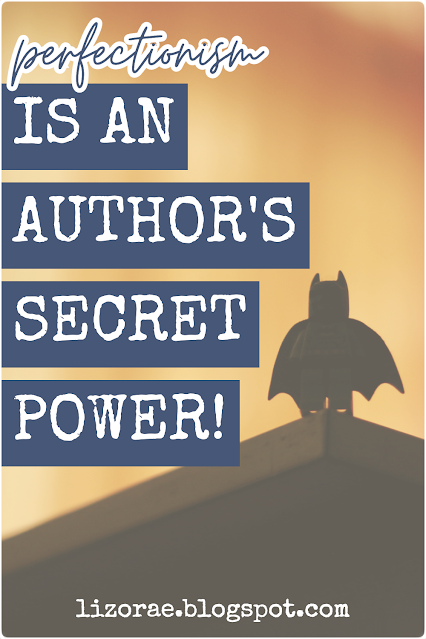When To Use Perfectionism In Writing
I'm an INFJ. This type is known for being a perfectionist. I'm also a Type 1 on the Enneagram, which is sometimes known as The Perfectionist. Yep. I'm notoriously perfectionistic. Back at school, I would procrastinate on tasks because I was trying to make it perfect. Trying to get that A+. (I later found out they didn't do A+'s so...yeah.)
I would spend all my time trying to make the project absolutely perfect. I'd do all the research, formatting and all the other things my younger self thought I had to do but I'd never actually do it. The night before whatever assignment I was doing was due, I'd rush everything. So of course it didn't meet my standard and of course I was tired the next day.
So then I tried to learn how to deal with perfectionism but treating it like a plague didn't sit well with me. Instead, I've realised that there's a time for perfectionism and a time for imperfectness. It's all about the balance. *sparkle fingers*
I would spend all my time trying to make the project absolutely perfect. I'd do all the research, formatting and all the other things my younger self thought I had to do but I'd never actually do it. The night before whatever assignment I was doing was due, I'd rush everything. So of course it didn't meet my standard and of course I was tired the next day.
So then I tried to learn how to deal with perfectionism but treating it like a plague didn't sit well with me. Instead, I've realised that there's a time for perfectionism and a time for imperfectness. It's all about the balance. *sparkle fingers*
1. Imperfectness is for research.
When you're starting out learning something, you're not gonna be perfect. You want to learn everything you can as efficiently as possible, but you won't be able to memorise it, Perfectionism. Thankfully, we authors are allowed to use the internet whenever we want, unlike in school, so memorisation isn't that important.
For example, say that you're writing about an archer with, uh, blonde hair. (Looking at you, Legolas.) You'd want to research how to shoot arrows and how to use a bow and how to take care of the bow and what does blonde hair have to do with archery. (Just kidding. Blonde hair has nothing to do with this.) You'd want to know every relevant fact so you don't have to research later. But you don't have to know everything. Thank the wonders of the internet, if you're writing and suddenly realise that you don't know how to string a bow, you can just add in a filler of made up facts and come back to it later to make it accurate.
2. Imperfectness is for planning.
You wanna know everything about your characters? You wanna build a whole new bread world? You wanna plan Every. Single. Plot twist?
 |
| From Giphy |
That's great! But you won't be able to make it perfect. I like to call planning the Time Of Scribbles and Mistakes. See, planning is uncovering everything about your characters, world and events then putting all the facts on paper so you can fill in the blanks. Sometimes, you might put down Character X is five years old and the realise a five year old couldn't possibly be Character X. What do you do? Whether you change X's age or character - whatever - you'd still scribble the previous information and add the new fact in. And you'd repeat this process of crossing out and rewriting facts quite a bit. You won't be perfect while you're planning, but...
3. Perfectionism is for finalising the plan.
You've finally finished planning and know you're ready to finalise it. You can finally unleash Perfectionism. What you do varies for different people. I'd say most of you would fix those little details that now bug you. Absolutely do that. I do give you this word of caution. Don't be sick with perfectionism. Ever. Yes you should use Perfectionism, but don't make yourself miserable over making every single thing perfect.
You might be saying, Liz, that's exactly what perfectionism is. To that I say, nah. I believe you can be a healthy Perfectionist or an unhealthy Perfectionist. I also believe that being nit-picky over details after all the planning is done is okay. It's much easier to rewrite a plan that it is to rewrite the whole book.
4. Imperfectness is for drafting.
Ah yes. Drafting. Everyone says your first draft is not going to be perfect. I say, all your drafts won't be perfect. Sure, they'd (hopefully) be better than your previous draft, but it still isn't perfect. By the drafting stage, you might have planned every beat and have perfectly logical sequences. But maybe your writing isn't engaging. Maybe you forgot your character has brown eyes and wrote that they have blue eyes. It doesn't really when you're drafting, especially in the early drafts. Drafting is a lot like planning. Both of them are putting all the content onto a page. It's like a word barf. A rainbow word barf. And like the excretion of substances through the mouth, it's probably gonna be all over the place. Imperfect. That's okay because the next step is editing.
5. Perfectionism is for editing.
Finally. This is the step where you can finally unleash the Perfectionism Beast. After all the drafting, this is the part where you make things as best as it can be. You don't like "he ran"? You can change it. You don't like "said"? You can change it. I'm not going to go into whether said is dead or not dead here - that's a different topic - but you can still change it. You'd want to go all Perfectionist in this stage because after this, you're going to the endgame. Read: You're going to send your baby you've worked hard on all these years out into the world of death and despair.
Okay, maybe it isn't that dramatic. However, people out there are still going to read your little story and criticise it. You want them to give you as many positive critics as humanely possible. Make that dialogue perfect. Make that action beat perfect. But again, don't be sick over it.
6. Perfectionism is for finishing it up.
By that, I mean copyediting and that jazz. (Why is it called "jazz"?) You want to make your book look nice, so make it pretty. Make sure your font is easy to read and you don't have any awkward mistakes. Maybe you have a few types here and there. Let your Perfectionism tidy up your book's tie and release your book into the world.
 |
| Remember what happened to this bird? From the Ice Age Wiki Fandom |
~
If I could sum it up in one sentence, it would be this: Forget perfectionism until you edit, but don't be sick over making it perfect. All things considered, nothing is ever going to be perfect. But hey, we can keep working on it until we're happy, right? If we're happy with it, chances are the other people are going to be happy with it. And maybe that's enough.Related Post:
Perfectionism In Writing

Comments
Post a Comment